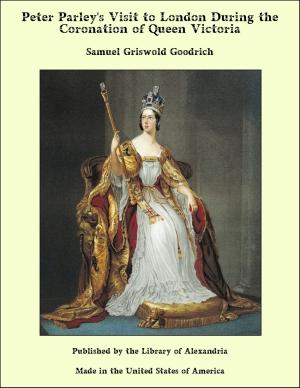| Author: | Richard Jefferies | ISBN: | 9781465619204 |
| Publisher: | Library of Alexandria | Publication: | March 8, 2015 |
| Imprint: | Language: | English |
| Author: | Richard Jefferies |
| ISBN: | 9781465619204 |
| Publisher: | Library of Alexandria |
| Publication: | March 8, 2015 |
| Imprint: | |
| Language: | English |
HE book is not a novel" is a phrase often in the mouth of critics, who on second thoughts might, perhaps, add with less emphasis, "It does not conform to the common type of novel." Fortified, however, with that sense of rectitude that dictates conformity to our neighbours and a safe acquiescence in the mysterious movements of public taste, the critics have exclaimed with touching unanimity—"What a pity Jefferies tried to write novels! Why didn't he stick to essays in natural history!" What a pity Jefferies should have given us "Amaryllis at the Fair," and "After London"!—this opinion has been propagated with such fervency that it seems almost a pity to disturb it by inquiring into the nature of these his achievements. Certainly the critics, and their critical echoes, are united. "He wrote some later novels of indifferent merit," says a critic in "Chambers' Encyclopædia." "Has anyone ever been able to write with free and genuine appreciation of even the later novels?" asks or echoes a lady, Miss Grace Toplis, writing on Jefferies. "In brief, he was an essayist and not a novelist at all," says Mr. Henry Salt. "It is therefore certain that his importance for posterity will dwindle, if it has not already dwindled, to that given by a bundle of descriptive selections. But these will occupy a foremost place on their particular shelf, the shelf at the head of which stands Gilbert White and Gray," says Mr. George Saintsbury. "He was a reporter of genius, and he never got beyond reporting. Mr. Besant has the vitalising imagination which Jefferies lacked," says Mr. Henley in his review of Walter Besant's "Eulogy of Richard Jefferies"; and again, "They are not novels as he (Walter Besant) admits, they are a series of pictures. . . . That is the way he takes Jefferies at Jefferies' worst." Yes, it is very touching this unanimity, and it is therefore a pleasure for this critic to say that in his judgment "Amaryllis at the Fair" is one of the very few later-day novels of English country life that are worth putting on one's shelf, and that to make room for it he would turn out certain highly-praised novels by Hardy which do not ring quite true, novels which the critics and the public, again with touching unanimity, have voted to be of high rank. But what is a novel? the reader may ask. A novel, says the learned Charles Annandale, is "a fictitious prose narrative, involving some plot of greater or less intricacy, and professing to give a picture of real life, generally exhibiting the passions and sentiments, in a state of great activity, and especially the passion of love." Well, "Amaryllis at the Fair" is a fictitious prose narrative professing to give a picture of real life, and involving a plot of little intricacy. Certainly it exhibits the passions and sentiments in a state of great activity. But Mr. Henry Salt, whose little book on Jefferies is the best yet published, further remarks: "Jefferies was quite unable to give any vivid dramatic life to his stories . . . his instinct was that of the naturalist who observes and moralizes rather than that of the novelist who penetrates and interprets; and consequently his rustic characters, though strongly and clearly drawn, do not live, as, for example, those of Thomas Hardy live. . . . Men and animals are alike mere figures in his landscapes."
HE book is not a novel" is a phrase often in the mouth of critics, who on second thoughts might, perhaps, add with less emphasis, "It does not conform to the common type of novel." Fortified, however, with that sense of rectitude that dictates conformity to our neighbours and a safe acquiescence in the mysterious movements of public taste, the critics have exclaimed with touching unanimity—"What a pity Jefferies tried to write novels! Why didn't he stick to essays in natural history!" What a pity Jefferies should have given us "Amaryllis at the Fair," and "After London"!—this opinion has been propagated with such fervency that it seems almost a pity to disturb it by inquiring into the nature of these his achievements. Certainly the critics, and their critical echoes, are united. "He wrote some later novels of indifferent merit," says a critic in "Chambers' Encyclopædia." "Has anyone ever been able to write with free and genuine appreciation of even the later novels?" asks or echoes a lady, Miss Grace Toplis, writing on Jefferies. "In brief, he was an essayist and not a novelist at all," says Mr. Henry Salt. "It is therefore certain that his importance for posterity will dwindle, if it has not already dwindled, to that given by a bundle of descriptive selections. But these will occupy a foremost place on their particular shelf, the shelf at the head of which stands Gilbert White and Gray," says Mr. George Saintsbury. "He was a reporter of genius, and he never got beyond reporting. Mr. Besant has the vitalising imagination which Jefferies lacked," says Mr. Henley in his review of Walter Besant's "Eulogy of Richard Jefferies"; and again, "They are not novels as he (Walter Besant) admits, they are a series of pictures. . . . That is the way he takes Jefferies at Jefferies' worst." Yes, it is very touching this unanimity, and it is therefore a pleasure for this critic to say that in his judgment "Amaryllis at the Fair" is one of the very few later-day novels of English country life that are worth putting on one's shelf, and that to make room for it he would turn out certain highly-praised novels by Hardy which do not ring quite true, novels which the critics and the public, again with touching unanimity, have voted to be of high rank. But what is a novel? the reader may ask. A novel, says the learned Charles Annandale, is "a fictitious prose narrative, involving some plot of greater or less intricacy, and professing to give a picture of real life, generally exhibiting the passions and sentiments, in a state of great activity, and especially the passion of love." Well, "Amaryllis at the Fair" is a fictitious prose narrative professing to give a picture of real life, and involving a plot of little intricacy. Certainly it exhibits the passions and sentiments in a state of great activity. But Mr. Henry Salt, whose little book on Jefferies is the best yet published, further remarks: "Jefferies was quite unable to give any vivid dramatic life to his stories . . . his instinct was that of the naturalist who observes and moralizes rather than that of the novelist who penetrates and interprets; and consequently his rustic characters, though strongly and clearly drawn, do not live, as, for example, those of Thomas Hardy live. . . . Men and animals are alike mere figures in his landscapes."















